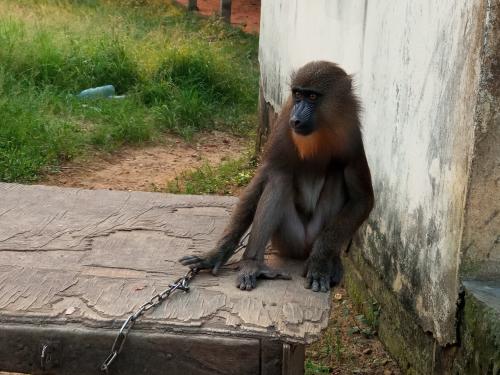A city council worker arrested with a live mandrill

A city council worker in Kribi has been arrested for the illegal possession and trafficking in a mandrill. He was apprehended on July 7 at the Dombe neighbour.
He was arrested during a crackdown operation carried out by wildlife officials of the Ocean Divisional Delegation of Forestry and Wildlife, in collaboration with the Gendarmerie Company.
Wildlife officials arrested the suspect at his home when he was just about attempting to sell a mandrill. The little animal was chained to a cage placed in an open space at the entrance of the residence.
According to sources close to the case that spoke on condition of anonymity, the suspected trafficker bought the animal from a small town called Bipindi, situated some 78km from Kribi. The sources equally said he was repeatedly told and advised to give away the animal to wildlife authorities but he persisted in keeping in the mandrill.
The trade in mandrill is increasingly recurrent in the country, a woman was arrested last month in Mintom illegally trading in a baby mandrill. The situation is very disturbing and many conservationists have underlined the need to rescue the species urgently as it is facing a high risk of extinction in the wild. They say the application of wildlife laws need to be stricter on wildlife traffickers to fight the sense of impunity among traffickers and equally to stem laxity of those who apply the law. This will according to them, create deterrence in illicit wildlife trade. They further argue that less punishment to traffickers is as good as encouraging them to continue to destroy wildlife as well as to promote zoonosis.
Some countries are listening to the voices of these conservationists to severely punish wildlife traffickers. Early this month, the Dolisie Court of First Instance in the Republic of Congo sentenced two wildlife traffickers to two years in prison.
Mandrills are the largest of all monkeys. They are extremely colourful and easily identifiable by the blue and red skin on their faces as well as their brightly hued rumps. They live only in the rain forest of equatorial Africa, they are shy and reclusive primates. Mandrills are totally protected by the 1994 wildlife law of the country.
